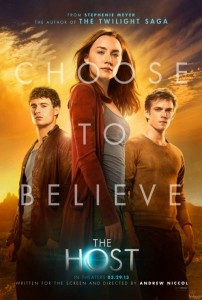 It’s an old adage in Hollywood (it’s not) that you “don’t look a casting director horse in the gift mouth,” but you have to imagine one looks at the heap of shit and controversy that people like Robert Pattinson and Kristen Stewart have dealt with on their respective paths to fortune and fame and wonder if getting involved with a Stephanie Meyer franchise is really the way to go.
It’s an old adage in Hollywood (it’s not) that you “don’t look a casting director horse in the gift mouth,” but you have to imagine one looks at the heap of shit and controversy that people like Robert Pattinson and Kristen Stewart have dealt with on their respective paths to fortune and fame and wonder if getting involved with a Stephanie Meyer franchise is really the way to go.
Fortunately for Max Irons and Jake Abel, their experience on The Host has so far kept itself contained to the parameters of normal reality, and they don’t really feel like their film lends itself to the insanity of Meyer’s other work. I had the opportunity to question them about this and other topics in a roundtable interview about the Andrew Niccols-directed scifi adaptation of Twilight-writer Stepahanie Meyer’s other literary franchise (which remains only one book deep at present).
Frankly, the film in question is indefensible dogshit, but I have to hand it to Mr. Irons and Mr. Abel- they make a great team, they’re both thoughtful, generous interviewees, and they bring as much class to a room as you could ever hope from people in their position. I think the chat is an interesting one, regardless of the ultimate quality of the film (and that ultimately quality is dogshit). Oh, and for fans of Max’s Dad, Jeremy Irons, there’s a fun bit towards the end you might care to check out.
Per usual I’ve highlighted my own questions in green, so you know what I brought to this conversation (for better or for worse).
+++++++++++++++++
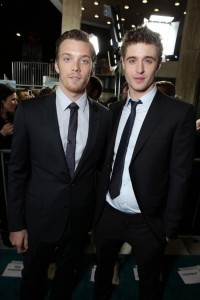 Q: What scene from the book that’s in the movie are you most excited for fans to see?
Q: What scene from the book that’s in the movie are you most excited for fans to see?
Jake: I quite like the chase scene. It’s one I’m not in.
Max: It’s quite good.
Jake: There’s a chase scene where it’s Aaron [Lee Hardee] and Brandt [Mustafa Harris].
Max: Yep.
Jake: And they’re two of–well, they’re humans with us and they are out on a raid and they sort of, they get made, get found out. And it’s a really great chase sequence with them that ends rather tragically. And I was always actually surprised how much it affected–how much I got affected by it. It’s good.
Max: And they get cornered and they have to make a choice of whether to let themselves be taken or take their own lives, and they make a choice. It’s quite moving.
Jake: Andrew Niccol films a good action sequence.
Max: Indeed.
CHUD: So this is not the first rodeo for either of you in this genre. But when you’re entering Stephenie Meyer territory, there’s obviously kind of–you don’t know exactly how huge this thing is going to blow up and what kind of cult will form up around it. So did you have to, in any way, weigh your decision or prepare yourselves for the massive hype that could potentially explode with this kind of movie?
Jake: No, not at all. I think it’s all about the work; it’s all about the material. Any film you decide to do, I think for both of us, it’s always the script and the director and the filmmakers. And this one was special and unique. Andrew Niccol is a fantastic director/writer. Saoirse Ronan is an incredible actress. And there is something to be said about the way Stephenie Meyer is able to touch a massive audience. It’s fantastic, you know, I’m in awe.
Max: And also I think Twilight was the first, maybe Harry Potter as well; there was such a hype around those books. I heard a story about Robert Pattinson being chased through the streets of Paris by loads and loads of girls before he even started filming the first one. That hasn’t happened to either of us. Thank God.
CHUD: Give it time.
Max: I know there are a lot of people who love The Host which is great, but it’s not quite on the same scale.
Jake: It’s a little more grown-up, in the right ways. It’s a Sci-Fi flick with yes, obviously romantic undertones which are important. But I don’t think it’s sort of pigeonholed itself into just being a Twilight crossover and that’s it. I would completely in full confidence recommend this to my brother, who is a 32-year-old guy. I really think he’ll enjoy it, besides having his brother in it. And I think that’s great for Stephenie, that’s great for all of us in a way. Broadens the demographic.
Q: I’m sure it was your first time sharing a love interest with another actor. What was the relationship dynamic on film and off?
Max: The thing is we’re all–thank God because it can be terrible if it’s not the case–but we’re all such good friends. So we’re light about it, it’s not too serious, there isn’t too much tension, there’s no competition or anything like that so it was kind of–
Jake: And everyone’s really professional about it. I mean it’s always–it’s always strange whether you’re sharing each other or not. The first time you go in and you’re going to kiss your co-star and whatever and you’re going to be intimate in front of people, yeah it’s always strange. But then once you do it once or twice, you just kind of get on with it.
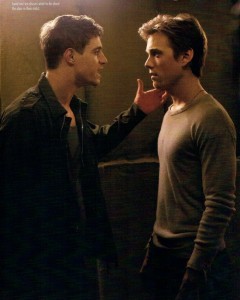 Q: Of all the different characters essentially that you were in love with?
Q: Of all the different characters essentially that you were in love with?
Jake: Yeah, in a way, yeah because there’s two people inside of her.
Max: I mean, I think if you look at the whole thing from an outside point of view, it’s quite confusing, it’s quite complex. But, in fact, from our point of view, it’s kind of simple. That different point of view causes us to have a bit of a feud but they are sort of simple. I mean, to me she is my la mie that’s been taken up, and I need that thing that’s taken her up to be gone.
Jake: She’s just the alien to me.
Max: Which he cherishes so it’s simple to us but complex…
Jake: More complex for Saoirse too.
Max: Exactly.
Jake: She had all the hard work.
Q: Was it, for Andrew, both writing the script and directing it, do you think it was easier for him to do this this way, I mean instead of having to worry about somebody else’s words? And also could he give you more insight into what he wanted from the characters?
Jake: I think he worked closely with Stephenie actually and we got very lucky because this is one of the first things that he’s adapted. I mean, Andrew’s been so lucky; he gets to write his own material and make his own material. He and Stephenie worked pretty closely together. The film doesn’t deviate a lot from the book, in fact what I think fans will like. It’s just a more condensed, tightened version of it. Characters are still as developed as they were in the book; the plot was still as developed as it was in the book. I think what really gave us the insight we needed was two weeks of rehearsal that was gifted to us in the beginning, which never happens.
Max: And we were allowed to put ideas forward through Andrew to Stephenie which would come back from Stephenie through Andrew to us, so it felt collaborative–
Jake: And safe.
Max: –which is so rare ‘cause often it’s the studio system where practically all the ideas are coming from one direction that’s above down to you and you just have to swallow them, whereas this, it was wonderful.
Jake: Very democratic this one, it was nice.
Q: You guys have both done fantasy movies before and now this is, of course, a Sci-Fi. Is that something you are both particularly attracted to or is that just a coincidence?
Max: I am personally much more into Science Fiction than Fantasy. We worked with Andrew Niccol who as we’ve said before (inaudible) it’s kind of great.
Jake: Yeah.
Max: It’s kind of cool.
Jake: I haven’t hunted out the genre films solely. That’s kind of what’s being made right for young actors and I think we’re both very picky about what we do and these–films like these–what was happening is there’s a shift in these sort of young adult adaptations where they’re not just these cheesy quick slop-it-together-throw-it-out-there. They are hiring people like William Hurt to be in these movies. I think Kate Winslet is about to do one. But they are now surrounding these films with really talented actors and really great directors. It’s sort of changing the face of what it means to be a young adult adaptation and that makes a lot of sense to me right now, for being a young actor and being able to work with someone like William Hurt who I might not ever have had an opportunity to work with.
Max: I think Christopher Nolan has probably got a lot to be thankful in regard to reminding people that actually audiences want to be challenged and want to see beautiful pictures as opposed to just another title out a year later.
Jake: A great observation actually. Thank you, Christopher Nolan.
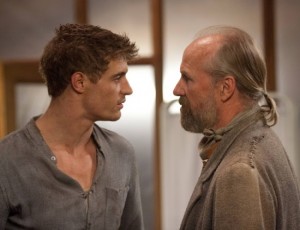 Q: Tell me a little bit about working with Mr. Hurt. I mean like you said, that’s not an everyday opportunity. I have to imagine he brings some serious weight to that set that a hungry young actor would want to feed off that.
Q: Tell me a little bit about working with Mr. Hurt. I mean like you said, that’s not an everyday opportunity. I have to imagine he brings some serious weight to that set that a hungry young actor would want to feed off that.
Max: That was sort of it, wasn’t it? He was–I mean we had the cave mentality very much so when–especially when we were in the studio. We were all there day in and day out and William was our spiritual leader.
Jake: Yes, he was.
Max: And our professional kind of tutor, for lack of a better word. But I mean you just watch him and you learn.
Jake: I’ve never seen someone stand up for the actors as much as he does. His ways may be a bit peculiar sometimes, but at the end, we were the most protected people on set because if a scene wasn’t going right, he would just put his food down and say, “This is not going right,” and he would demand that we–that whatever it took to get it there, and it would be frustrating, it would be hard, but then by the end of it, we would be thanking him. There is a method to his madness completely. And he was the one that requested two weeks of rehearsal beforehand, which was integral to making this film. It would not be the same film. I really stand by this film and I think it’s from two weeks rehearsal and as William called it, we interrogated the script for the truth, and that really stuck with me.
Q: I read that you listened to an audiobook of The Host during a dental appointment.
Max: I’m dyslexic and it’s a long book.
Q: Do you feel like that environment at all affected how you perceived the book?
Max: Yeah. Its characters are full of pain; I was full of pain that day. Maybe there’s a connection there. But yeah, it was a four-hour dentist appointment so I got at least 200 pages done.
CHUD: Efficiency!
Jake: Something could have gone horribly wrong in the appointment.
Max: Oh, my God. I had so many problems; I don’t want to go into it. Problem after problem; you solve that one, you discover another one. I do brush my teeth often; it’s not lack of hygiene. I think it’s genetics more than anything. But this isn’t this a Q & A about my–
CHUD: We can take it in that direction.
Q: This is a Sci-Fi film, but what are the other dimensions of the film do you think will attract other viewers besides Sci-Fi fans?
Jake: Well, like we’ve said, the romantic undertone which they obviously want us to push. But what’s fascinating, what I think will surprise audiences most is it’s really not about these two motherfuckers fighting over this girl.
Max: It is a bit.
Jake: It is a bit, but there’s more relationships than that. She has a relationship with herself with the alien in her head which is really quite touching. But there’s an end scene where she has a scene by herself, the camera is on top of her, and she’s speaking out loud to the voice inside her head, which we hear through voiceover. And I had to remind myself halfway through that she was doing the scene by herself. She also has a relationship with her little brother, with her uncle played by William Hurt; so there’s a dramatic tale in there of loss and coping with loss and what it means to understand your enemy.
Max: And it’s also a story of survival and everyone’s finding out and questioning the best way to survive, and indeed should they survive; should we as a species survive? And I think that’s a question that we can take away, you know, unlike most alien invasion films which involve lasers and spaceships blowing up the White House. This is a benign almost–it’s like an intervention. We’re throwing ourselves, they are going to come to our rescue and for the betterment of the planet and a species take over, which is an interesting question which you’ve got to ask yourself: If they did successfully take over the world, would the world indeed be a better place?
Q: So the sequel. If there was to be a sequel, what would you like to see happen with your characters?
Jake: I want to shoot a gun.
Max: Yeah.
Jake: I would like to drive a car. I would like to do something a little bit more manly.
Max: Now, see I heard, I heard a rumor about a sequel that Ian plays a bit of guitar, does singing.
Jake: That would be nice too–and a little dancing.
Jake: Yes. Actually we were supposed to write something–Antonio Pinto wrote something for me to play in the film and I started to learn it. And then halfway through, Stephenie was like, “No, not yet, not yet, not yet.” So apparently, there is something, yeah.
Max: And it has a lovely score too.
Jake: Quite lovely.
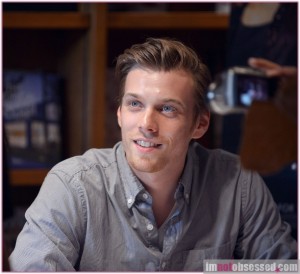 Q: I think I saw something where you practice the guitar on set all the time or something like that?
Q: I think I saw something where you practice the guitar on set all the time or something like that?
Max: (Whispering) All the time.
Jake: Hey, what can I say, you know?
Max: No, it’s lovely.
Jake: Okay, say. I’m not going to push it on people, but when they ask me to play, you know.
CHUD: So tell me a little bit did you guys have any interaction with Ms. Meyer and kind of picking her brain about the… interesting… subtext she likes to infuse in her romances?
Max: She’s very–I don’t know about interesting subtext. I think we’re all–we didn’t really–we sort of avoided that. But we did ask about the subtext with our own characters in The Host. But she was–again she kind of trusted us. She said, “Now you’re doing okay; if you’re not doing okay, we’ll tell you, but trust your instincts.” “You’re Jared, you’re Ian; now go with it, make him yours, don’t take it from me, take it from yourselves,” which is nice.
Jake: What I think she was probably surprised by the fact that since this second book may technically not be finished written or the third book she wants to do, I think we’ve started as actors to influence her visualization of these characters. With the Twilight series, they were already written and so the actors really had no room to inspire her. But I think she had said a couple of times, “I like to watch you guys because it’s given me things–oh, I didn’t think about that, oh, Jared’s like this, Ian’s like that.” And I imagine that was probably pretty interesting to her to see what would happen.
Max: Yeah.
Jake: She’s very open to that, she’s very collaborative. And that’s very, very lucky because not all authors are that way. Rightly so too because it’s–
Max: It’s their creation.
Jake: –their babies and they’re allowing us to go in, do our best to put it on its feet.
Max: Right on.
Q: What’s your perspective on The Host on aliens in general?
Max: How do you mean? Our perspective on aliens?
Q: Yeah. What’s your–
Jake: Do we believe in aliens, I think is what you are asking.
Q: Yeah.
Max: Definitely.
Jake: Absolutely.
Max: Absolutely. Why would we be the only ones?
Jake: Well, it’s a numbers game and its an odds game. And I think when you have billions of universes–
Max: The odds are stunningly against you.
Jake: –there’s gotta be something. And who know? Maybe they’re little ribbon-like creatures which is interesting because usually we see them as, you know, big eyed or something very human like. And I like that she took a different approach and says, “Maybe they don’t resemble humans at all; maybe they can sort of take the form of any and all things at their whim.
Max: Why wouldn’t they? Who knows?
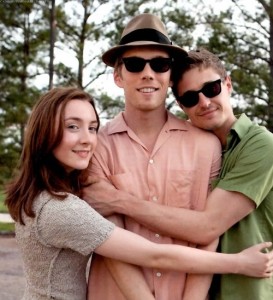 Q: I know you guys said that you haven’t had any crazy fan experiences yet but have you had any memorable fan experiences with fans of the book?
Q: I know you guys said that you haven’t had any crazy fan experiences yet but have you had any memorable fan experiences with fans of the book?
Jake: I think the most gratifying part is the young kids that come out. They get really excited about these books.
Max: We had a book signing conference yesterday, which was sort of exhausting, dah, dah, dah, dah, dah. But you see some of their faces and even for a moment or for an hour or something it might make them happy so it’s nice, it’s nice to do the little that you can and it is very little but if it makes them that little bit happier, it’s nice.
Jake: Yeah, these series that Stephenie writes becomes life to some people and, you know, we do have a certain duty to sort of nurture that in some way. I don’t know if that’s the right way of saying it but it is–it’s very nice to have them come out and–
Max: And they seem to like what they see.
Jake: And not say, ‘I don’t like you as Jared, you’re horrible.”
Max: Too skinny.
Jake: Hasn’t happened yet.
CHUD: Give it time.
Jake: Yeah, right.
CHUD: But no bricks through the window yet?
Jake: Nothin’ yet.
Max: Not yet.
Jake: We’re ridin’ high. (laughter)
Q: What did you, having made this movie and it’s certainly got an undercurrent of as you said earlier about aliens bringing in a different culture, what experience did you get out of this? Did it change your mind on anything or I mean as far as people mixing together and getting along and stuff because it brings up a lot of those moments?
Jake: Yeah, it definitely circles this sort of idea that which is very true I think in humans is to fear that which we don’t understand. And in the film, we don’t yet understand these aliens. We have all these preconceived notions about them and because of that, we keep them at a very long distance away, and a very hostile distance away until we have no choice but to get to know one. And this one alien turned out to be more human than–I think it’s even a line I say in the movie–she turns out to be more human than we are. I’m transcending. And I think that it’s an interesting–
Max: Yeah, idea.
Jake: –idea to say, you know, well, if you are forced to get to know someone they might not be exactly who you think they are. I mean, yeah.
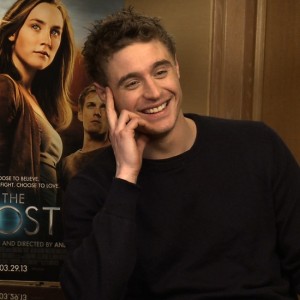 CHUD: Mr. Irons, I would have to imagine throughout much of your life, your father has given you a lot of advice and things like that. But right now your father happens to be entering a space which you have a little bit more experience in terms of this young targeted–
CHUD: Mr. Irons, I would have to imagine throughout much of your life, your father has given you a lot of advice and things like that. But right now your father happens to be entering a space which you have a little bit more experience in terms of this young targeted–
Max: I actually never thought of it like that! The student becomes the teacher…
CHUD: So I was curious if maybe you gave him any advice on how to deal with roving teenagers, worried about continuity and things like that?
Max: No, I never, I never really did. No, I would never dare. (laughter) But he often–he finds this unusual, the fact that I’m here doing this, the amount of press. He finds the idea of Twitter and the internet and Face book and that kind of marketing which is a lot of what happens now, he finds that very peculiar so I have to explain that kind of thing to him. He can barely work his mobile phone which is still from the 90s–and I’m not even kidding–still. It’s unbelievable. And he can’t turn the volume down, it’s umm–anyway, that’s about it. I mean we don’t really–you know, I’m his son, he’s my dad. He doesn’t give me advice too often. He sort of knows it irritates me, even though I should probably take it.